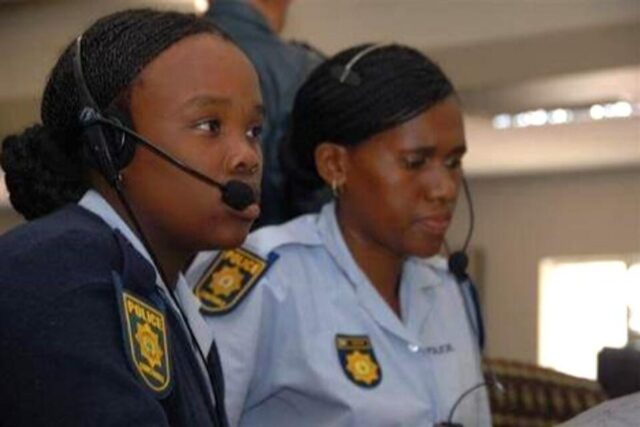Minister of Police Bheki Cele has revealed that in the Northern Cape, it takes more than an hour on average for the police to respond to a violent crime or a crime in progress, the slowest response time in the country.
THE MINISTER of Police, Bheki Cele, revealed that in the Northern Cape, it takes more than an hour on average for the police to respond to a violent crime or a crime in progress.
In response to a recent parliamentary question by the DA, Cele revealed that the South African Police Service (SAPS) in the Northern Cape has the poorest performance in terms of average response times when handling calls to the 10111 emergency call centres.
The data provided by Cele has also raised questions about how incidents are prioritised.
DA MP Okkie Terblanche, who is a member of the portfolio committee on police, had asked Cele for the average response time for SAPS first responders to calls emanating from 10111 calls and dispatch centres in each province.
In reply, Cele said the average response times with police stations linked to 10111 command centres were broken down into three complaint categories: Alpha, Bravo and Charlie.
A policing consultant with the Institute for Security Studies (ISS), David Bruce, said Alpha complaints are deemed very urgent, Charlie complaints are the least urgent and Bravo complaints are somewhere in between.
Gauteng had the best response times out of all the provinces at 11.56 minutes when responding to Alpha complaints, 12.38 for Bravo complaints and 12.26 for Charlie complaints.
In KZN, the Alpha response time averages 21.44 minutes, while for Bravo it is 24.20 minutes and for Charlie it is 21.51.
The Western Cape had response times ranging from 17.57 minutes for Alpha, 20.18 for Bravo and 19.02 for Charlie.
Limpopo also had response times under 20 minutes for all categories, while Mpumalanga averaged around 23 minutes, with Bravo complaints at 28 minutes. The Free State averaged between 28 and 36 minutes.
The rest of the provinces had response times that were over half an hour, with the longest times being in the Northern Cape with more than an hour for all categories.
Terblanche said that from these response times, it is clear that “criminals have all the time in the world to do their bidding without any fear of SAPS intervention”.
Bruce said that at face value this data shows the time that it takes from receiving the call to arriving at the scene of the incident.
“I find the data puzzling and even go so far as to say that it doesn’t make much sense,” he added.
He said the average response time for Alpha complaints should be much faster than for Charlie complaints.
“However, the data appears to show that there is virtually no difference between the fastest responses (Alpha) and the slowest responses (Charlie),” said Bruce.
He pointed out that in the Free State, the average response times for low-urgency Charlie complaints were faster than for very urgent Alpha complaints.
“In the Free State they are reporting that the average response time for a low urgency Charlie complaint (28.30) is one minute and 30 seconds faster than a top priority Alpha complaint (29.59).
“It also indicates that they on average take seven minutes and 45 seconds less to respond to a Charlie (28.30) complaint than to a Bravo complaint (36.14),” he said.
Bruce said that according to the data, the average response time in KZN for Charlie complaints is only seven seconds less than for Alpha complaints.
In Gauteng, it is only 30 seconds less; in Limpopo it is less than a minute; in the Western Cape and the Northern Cape it is less than two minutes and in the Eastern Cape it is less than three minutes.
Blessed Gwala, IFP KZN provincial spokesperson for Community Safety and Liaison, said the party was sceptical about the data.
“What has been announced by the National Minister of Police, Bheki Cele, is not a true reflection of what ordinary citizens are experiencing when reporting crime through 10111,” he said.
Gwala said given the high crime rate in the country, the dysfunction of the 10111 emergency number was a grave and potentially catastrophic situation.
“Reporting crime is important for accurate crime stats. This gives the SAPS more leverage to request extra police officers, vehicles, etc. But with the dysfunction of 10111, it makes it impossible for people to report crime on time,” he said.
Terblanche said 10111 centres were aimed at ensuring the public could contact the police in cases of emergencies and to get a quick response time that may be the difference between life and death.
“The response times are not nearly satisfactory,” he said, adding that quite often the police do not answer calls at all.
It was also revealed that whereas the Eastern Cape and the Free State have four (4) 1011 command centres each, with Mpumalanga standing at three (3) and Limpopo at two (2), the rest of the provinces – including Gauteng, KwaZulu-Natal, and the Western Cape – are allocated only a single one.
Terblanche pointed out that the figures “come on the back of a previous response wherein it was revealed that 10111 centres across South Africa were grossly understaffed, with the SAPS managing to deploy only about 40% of what it considered to be the ideal staff complement to 10111 centres, nationally”.
“We cannot allow South Africans to be left in the lurch when they are at their most vulnerable. These response times are simply not acceptable in a time when more than 85 people are murdered and 594 violently assaulted in our country each and every day,” said Terblanche.








